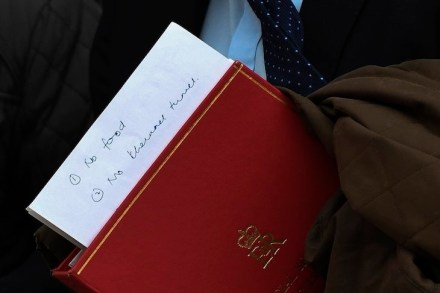Mel Stride’s picture perfect ‘no deal preparations’
With only one day to go until the vote on Theresa May’s Brexit deal, the government has been doing its best to convince wavering MPs that supporting it is the only way to avoid the catastrophic consequences of no-deal Brexit. Which may explain why the Financial Secretary to the Treasury, Mel Stride, was snapped today carrying these scary notes on a piece of paper (conveniently sticking out of his folder) as he left a meeting in 10 Downing Street: Mel Stride Financial sec to treasury paymaster gen leaving this afternoons brexit cabinet meeting showing some disturbing facts !!!! pic.twitter.com/Mgf3vWPCyi — PoliticalPics (@PoliticalPics) January 14, 2019 But if Mr Steerpike could




















